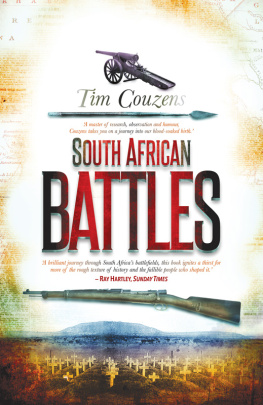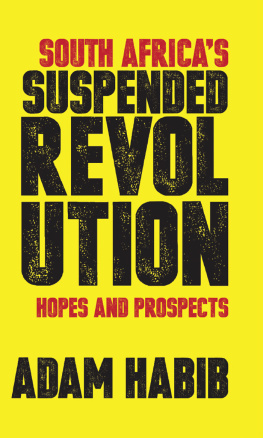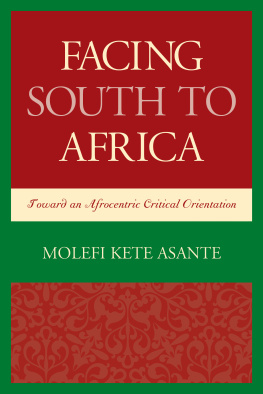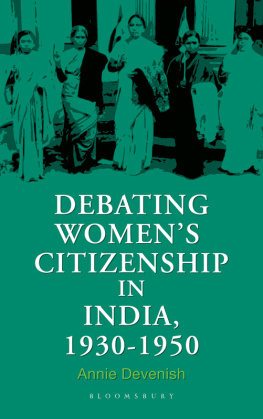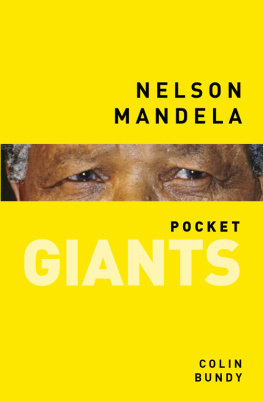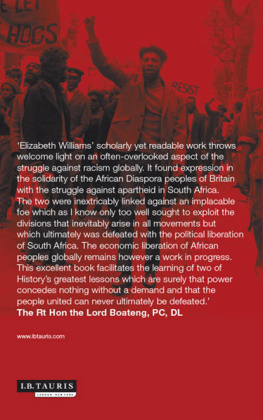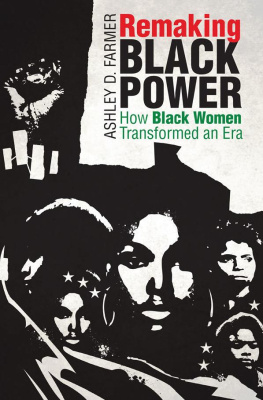Josie Mpama/Palmer
OHIO SHORT HISTORIES OF AFRICA
This series of Ohio Short Histories of Africa is meant for those who are looking for a brief but lively introduction to a wide range of topics in African history, politics, and biography, written by some of the leading experts in their fields.
Steve Biko
by Lindy Wilson
Spear of the Nation (Umkhonto weSizwe): South Africas Liberation Army, 1960s1990s
by Janet Cherry
Epidemics: The Story of South Africas Five Most Lethal Human Diseases
by Howard Phillips
South Africas Struggle for Human Rights
by Saul Dubow
San Rock Art
by J.D. Lewis-Williams
Ingrid Jonker: Poet under Apartheid
by Louise Viljoen
The ANC Youth League
by Clive Glaser
Govan Mbeki
by Colin Bundy
The Idea of the ANC
by Anthony Butler
Emperor Haile Selassie
by Bereket Habte Selassie
Thomas Sankara: An African Revolutionary
by Ernest Harsch
Patrice Lumumba
by Georges Nzongola-Ntalaja
Short-changed? South Africa since Apartheid
by Colin Bundy
The ANC Womens League: Sex, Gender and Politics
by Shireen Hassim
The Soweto Uprising
by Noor Nieftagodien
Frantz Fanon: Toward a Revolutionary Humanism
by Christopher J. Lee
Ellen Johnson Sirleaf
by Pamela Scully
Ken Saro-Wiwa
by Roy Doron and Toyin Falola
South Sudan: A New History for a New Nation
by Douglas H. Johnson
Julius Nyerere
by Paul Bjerk
Thabo Mbeki
by Adekeye Adebajo
Robert Mugabe
by Sue Onslow and Martin Plaut
Albert Luthuli
by Robert Trent Vinson
Boko Haram
by Brandon Kendhammer and Carmen McCain
A Short History of Chinua Achebes Things Fall Apart
by Terri Ochiagha
Amlcar Cabral
by Peter Karibe Mendy
Wangari Maathai
by Tabitha Kanogo
Josie Mpama/Palmer: Get Up and Get Moving
by Robert R. Edgar
Female Monarchs and Merchant Queens in Africa
by Nwando Achebe
Josie Mpama/Palmer
Get Up and Get Moving
Robert R. Edgar
OHIO UNIVERSITY PRESS
ATHENS
Ohio University Press, Athens, Ohio 45701
ohioswallow.com
2020 by Ohio University Press
All rights reserved
To obtain permission to quote, reprint, or otherwise reproduce or distribute material from Ohio University Press publications, please contact our rights and permissions department at (740) 593-1154 or (740) 593-4536 (fax).
Printed in the United States of America
Ohio University Press books are printed on acid-free paper

30 29 28 27 26 25 24 23 22 21 20 5 4 3 2 1
Library of Congress Cataloging-in-Publication Data
Names: Edgar, Robert R., author.
Title: Josie Mpama/Palmer : get up and get moving / Robert R. Edgar.
Other titles: Ohio short histories of Africa.
Description: Athens, Ohio : Ohio University Press, 2020. | Series: Ohio short histories of Africa | Includes bibliographical references and index.
Identifiers: LCCN 2020001392 | ISBN 9780821424100 (paperback) | ISBN 9780821440940 (pdf)
Subjects: LCSH: Mpama, Josie, 1903-1979. | Women political activists--South Africa--Biography. | Communists--South Africa--Biography. | Anti-apartheid activists--South Africa--Biography. | South Africa--History--20th century.
Classification: LCC DT1927.M63 E34 2020 | DDC 968.05092--dc23
LC record available at https://lccn.loc.gov/2020001392
To the memory of Comrade Professor Phil Bonner, a friend who understood the distinction between scholarship and activism as well as how they can enrich each other
Contents
Illustrations
Preface
Researching the Life of Josie Mpama/Palmer
Piecing together the life of Josie Mpama/Palmer was challenging and required me to draw on a range of oral and written sources. My initial interest in her emanated from my research on Edwin Thabo Mofutsanyana, her common-law husband from the late 1920s to the late 1930s. I interviewed him at length in Lesotho (where he lived in exile) in the 1980s. After the dramatic change in South Africas political environment in 1990, I started collecting information on Josie. A starting point was an interview that Julia Wells conducted with her in 1977 that focused on her activism in the South African city of Potchefstroom. I interviewed two of her daughters, Carol and Hilda, in 1995 as well as close friends who lived in her neighborhood in 1998. Later I interviewed four of her grandchildren, Belinda and Virginia Palmer and Lorraine and Bella Johnson, who spent much time in her home in Mzimhlophe when they were growing up and who gave me their generations perspective on her.
I also identified a variety of written sources. I combed through Communist Party of South Africa (CPSA), left-of-center, and black newspapers published in the 1930s and 1940s. These contained materials on her public activities as well as columns by her on womens issues.
Government records at the National Archives in Pretoria yielded information on her father, Stephen Mpama: a divorce case, a criminal trial, and the estate record at his death. The archives also contained extensive Potchefstroom municipal records on the protests of the late 1920s in which Josie Mpama participated. In the 1920s and 1930s, the Justice Department issued regular reports on communist activities in the Union of South Africa that occasionally mentioned her activities. I also consulted the Justice Departments banning file on Josie Mpama from the 1940s and 1950s.
Critical records came from the papers of two important figures in the CPSA, Jack and Ray Simons, held at the University of Cape Town. Their papers include minutes of a critical CPSA central committee meeting at the end of 1938.
A crucial breakthrough came in 1998 when I examined the extensive Communist International (Comintern) and CPSA records at the Russian State Archive of Socio-Political History in Moscow. The CPSA may have been careful about defining its image to outsiders, but its records are remarkably revealing and do not shy away from revealing internal splits, personal disputes, and ideological controversies. When Josie was in Moscow for party training in 1935, she left writings, including an autobiography about her youth and candid essays detailing her views on CPSA matters. While there, she testified at an important Comintern hearing on ideological disputes within the CPSA that featured Moses Kotane and Lazar Bach.
Despite consulting this range of sources, I still found significant gaps in reconstructing phases of Josies life. I hope that other historians will unearth more material.
A Note on the Names Mpama and Palmer
Josie used two surnames, Mpama and Palmer. Mpama (sometimes spelled MPama) came from her father, Stephen Mpama. The change to Palmer, an anglicization of Mpama, came in the mid-1930s when she and her family were living in Sophiatown. The advantage of taking the name Palmer is that her children could, with a European name, qualify for better schools. Because she shifted back and forth between the names throughout her life, I have avoided confusion by often referring to her simply as Josie in my narrative.


